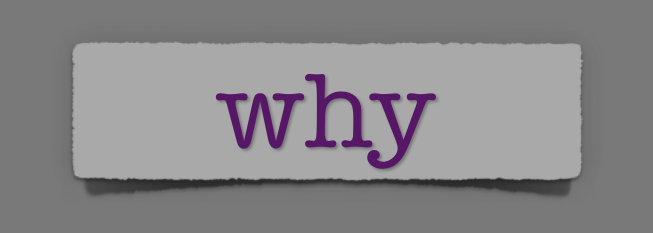In my days years ago as a hospital chaplain, I spent a lot of time working around the word why. In the context of illness and terminal diagnoses, the word was neither helpful nor hopeful. Why did I get cancer? Why is my father dead? Any answer comes up lacking because it seems to fall toward either blame or platitude. I didn’t know what to do with the word why.
Somewhere along the way in my first year of Clinical Pastoral Education, one of my supervisors offered something that helped: instead of asking why, he said, we do better to ask, “What does this mean for my life?” Instead of dwelling on the cause, look to the consequence, or even the possibilities. As someone in my early twenties who was not particularly acquainted with grief, the idea gave me language that helped me connect with people in the midst of pain I didn’t understand. Down the years since, I have still found it helpful to ask, “What does this mean for me?”
During my first year at the hospital, I met a woman who was dealing with a recurrence of breast cancer. She was thirty-two. Over the next couple of years, she was in and out of the hospital. I was assigned to the oncology floor and so I got to know her and her husband; they told me stories of their two children who were five and seven. The treatments were not successful and she died at thirty-five. She made meaning to the very end. One Friday morning as I visited, she asked if I would come by at the end of the day, which I did. We both knew she was in her last days. She wanted to say goodbye and was intentional about asking several of the staff she knew well to come and see her. As we talked she said, “I found out I had cancer my sophomore year in college and I had to drop out for a year to go through treatment. It was during my last year at school I met my husband. I’d do it all again if it meant I got to be with him.” That’s what it meant to her. At the end of our time she said, “I may not be here when you come back on Monday. Thank you and goodbye.” Early Sunday evening her husband called to tell me she had died.
I don’t know why.
A few months ago, I first learned of a TED Talk given in 2009 by a man named Simon Sinek. He is a business person and thinker and pretty interesting person. The talk grabbed me because he did something different with the word why. He made it something worth asking. His thesis is our “why” is at the core of who we are: our passion, our story, our purpose or cause for doing what we do. From the why comes the how—how we do what we do, and then the what—what we do or what we make. If we want to connect with others, if we want others to share our passion, we must connect them with the why or else they won’t get it.
The word why is not the problem—it’s how we use the word that makes the difference. “Why am I here?” is another way of asking “What is my purpose? What moves me to act? How can I make a difference? What does it mean to be me?” When we share our whys—what we believe, who we feel called to be—we offer invitations to relationship, to connection, to community. Sinek pointed out that Martin Luther King Jr. didn’t have an “I Have a Plan” speech; he had an “I Have a Dream” speech. And people followed.
The word why takes me one other direction. I can’t hear it without thinking of Shawn Colvin’s song, “I Don’t Know Why.” The middle verses of the song say
I don’t know why
but somewhere dreams come true
and I don’t know where
but there will be a place for you
and every time you look that way
I would lay down my life for you
I don’t know why
I know these things, but I doI don’t know why
but some are going to make you cry
and I don’t know how
but I will get you by, I will try
they’re not trying to cause you pain
they’re just afraid of loving you
I don’t know why
I know these things, but I do
Underneath her questions is a sense of solidarity, much like Sam Cooke singing, “Don’t know much about history . . . “—they both offer the hope of love in the midst of uncertainty.
but I do know that I love you
and I know that if you love me too
what a wonderful world it could be
The why we have to share with the world is we are here to love one another, every last one another, which means it could be a wonderful world.
Peace,
Milton

This one spoke to me, sir……..blessings to you.